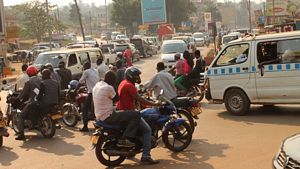|
By accessing or using The Crittenden Automotive Library™/CarsAndRacingStuff.com, you signify your agreement with the Terms of Use on our Legal Information page. Our Privacy Policy is also available there. |

New Ugandan Agency Avoids Real Road Safety Challenges
|
|---|
|
|
New Ugandan Agency Avoids Real Road Safety Challenges
Hilary Heuler, VOA News
21 February 2014 (9:29AM)
 An intersection is seen in Kampala, Uganda, Feb. 12, 2014. (Hilary Heuler/VOA) An intersection is seen in Kampala, Uganda, Feb. 12, 2014. (Hilary Heuler/VOA)
|
KAMPALA — In an attempt to combat the country's terrifying rate of traffic fatalities, the Ugandan government is setting up a new agency to promote better roads and safer driving. But the real problem may be impossible for the agency to tackle.
A handful of taxis are clustered at a busy Kampala intersection, their drivers sheltering from the sun on a makeshift bench in the shade. When customers were scarce, the life of a taxi driver could be slow. But once he got behind the wheel it was anything but.
Taxi driver Bashir Sabiiti said driving in Uganda can be hair-raising, and he knew a number of people who have been hurt or killed. The roads are in such poor condition that locals once fished from potholes in protest.
Plus, Bashir said, few drivers really knew what they were doing.
“Most cars now, they are automatic cars. So after knowing that this is drive, this is parking, this is advance, he or she starts driving. So most of them, they don’t know how to drive,” he said.
The law said a driver must attend driving school and pass a test to get a license. But, Sabiiti said, the law was easy to circumvent.
“Whoever has money, you can either get your driving permit minus going to be tested. You just go to the bank, you pay, [and] they just get for you that driving permit,” he said.
And if those people are stopped by police? Four to eight dollars, said Sabiiti, would get them off the hook.
“When the police stops you, you pull out something for the officer - either 10,000 or 20,000 - and that officer will let you go. It’s just because most of these guys, the police guys, they are not paid well,” he said.
In Uganda, catastrophic accidents are common, and, according to Nathan Tumushabe of the National Road Safety Council, they seem to be on the rise.
“The country loses more than 3,000 people a year. Those are dead, and for every one dead there are so many injured. When you look at our statistics, most of the affected people are what we call breadwinners, people with families who bring food to the table. And the trend seems to be increasing,” said Tumushabe.
Uganda is in the final stages of setting up a new National Road Safety Agency to educate the public, mobilize resources and conduct road safety activities. The agency would be modeled on a similar one in Ghana, said Tumushabe, where road safety has improved.
“They had drastically reduced accidents. We also think if we implemented ours rightly, we too can reduce the occurrence maybe by 50 percent in the same time span,” he said.
Tumushabe thought the biggest problem was a lack of awareness of why it was important to obey traffic rules, and admitted that tackling corruption would be outside the new agency’s mandate.
But Cissy Kagaba, director of the Anti-Corruption Coalition Uganda, said that the crux of the issue was the graft that ran throughout the sector, from corrupt police, who ignored the dangerous state many vehicles were in, to the road improvement funds that regularly disappeared.
“If you look at the budget that is allocated to the roads it’s one of the highest. But if you look at the quality of the roads, the roads are very, very poor. And some of them, within one, or even two or three or six months, they are already wearing down," said Kagaba.
The policies needed to cut down on road fatalities are already in place, she added.
“It’s just a matter of ensuring that the policies work, the systems are strengthened and followed through. It’s about the commitment from the powers that be to ensure that corruption is gotten rid of,” said Kagaba.
Unless this happened, said Kagaba, another road safety agency would not make any difference.


















 An intersection is seen in Kampala, Uganda, Feb. 12, 2014. (Hilary Heuler/VOA)
An intersection is seen in Kampala, Uganda, Feb. 12, 2014. (Hilary Heuler/VOA)
